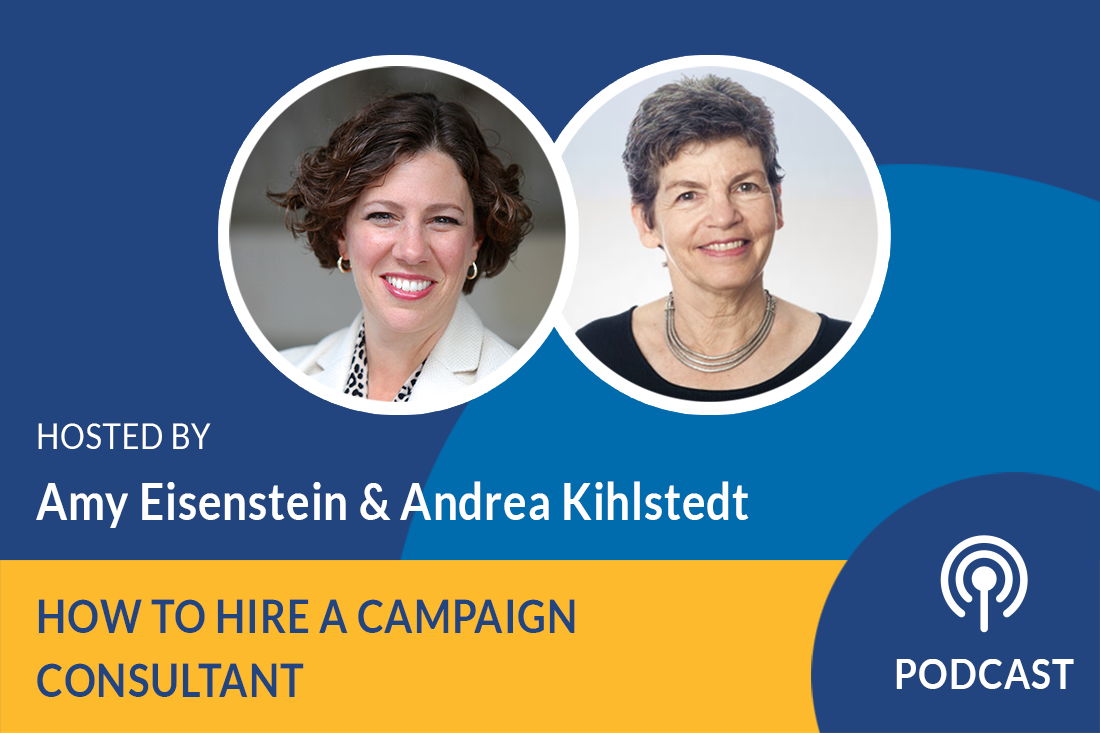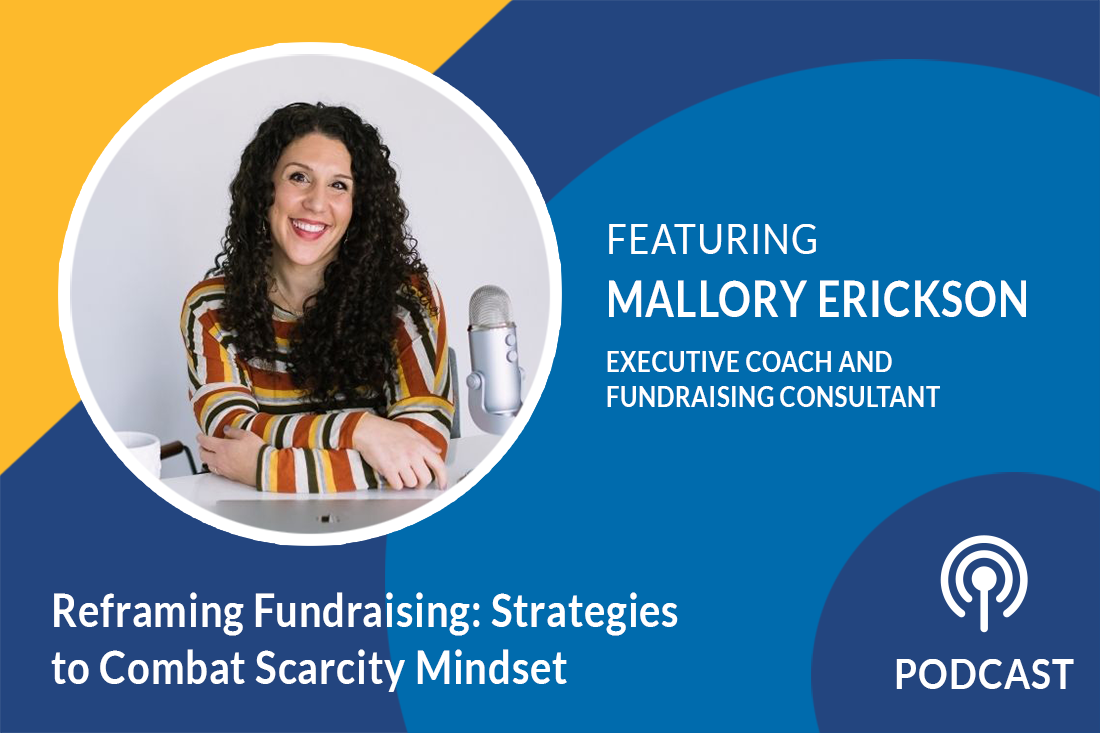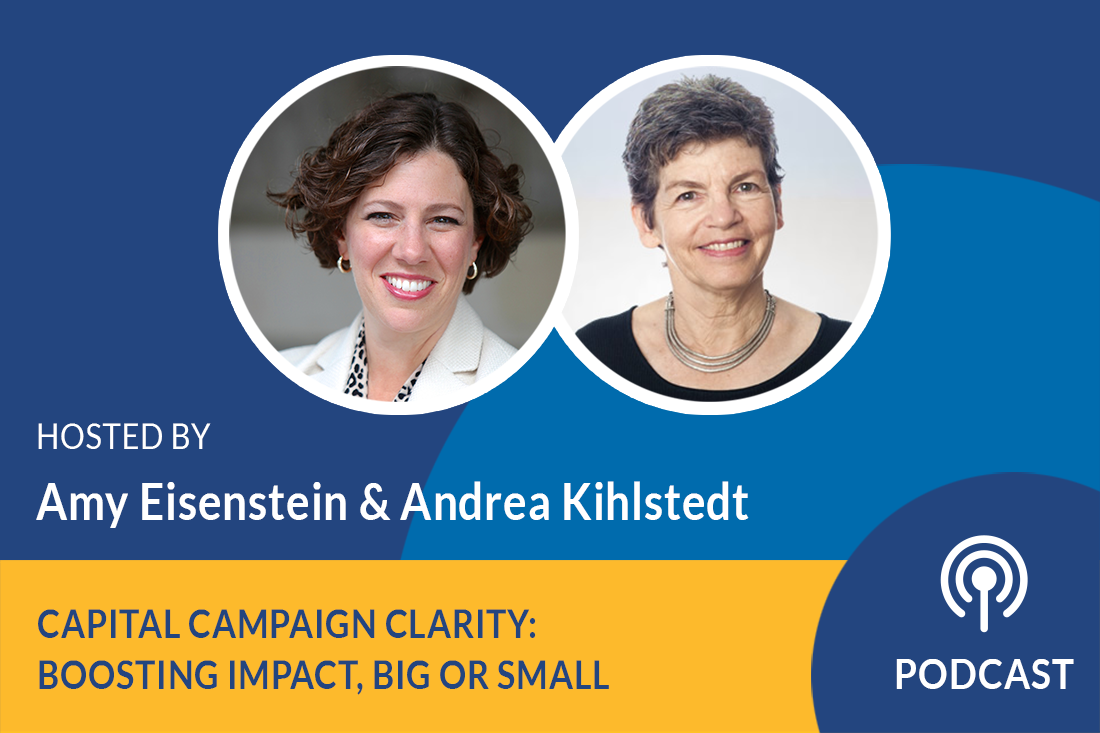Podcast: How to Hire a Campaign Consultant

Season 3, Episode 24
In this episode, Amy Eisenstein and Andrea Kihlstedt share invaluable insights on why your organization needs an expert consultant and how to go about finding the right one. They emphasize the importance of seeking guidance from individuals who have successfully led campaigns from start to finish, especially when you’re venturing into uncharted fundraising territory.
Discover why campaigns demand confidence and expertise, and how a seasoned consultant can provide the assurance and knowledge you need to raise substantial funds for your monumental projects.
Listen Now:
Andrea Kihlstedt:
If you’re just starting down the campaign mode, you’re going to want to hire a campaign consultant. And when you go about finding the right consultant, understand that the process is going to be incredibly useful to you.
So don’t think of it as a drudge; get rolling, and today we’re going to tell you how.
Amy Eisenstein::
Hi, I’m Amy Eisenstein. I have my colleague and co-founder Andrea Kihlstedt here with me. And today of course we are going to talk about how to hire the best campaign consultant for you and your organization.
Why a Capital Campaign Expert is Worth the Cost
Andrea, let’s start with why an organization should think about hiring a campaign consultant before we tell them how to do it. Why do you think it’s important for organizations to work with campaign experts?
Andrea Kihlstedt:
Well, there are very few organizations that have a lot of expertise about capital campaign fundraising. In fact, if you’re listening to this, I ask you, is there anyone in your organization that has taken a campaign from beginning to end once or twice or even three times?
Probably not — because most people are newbies when it comes to capital campaign fundraising.
Amy Eisenstein::
Yeah. So unless you have somebody at your organization who has led multiple campaigns from start to finish, it would be very wise to have somebody with expertise added to your team.
I mean, think about it. You are trying to raise two, five, 10 times more than you normally raise annually. And the idea that you’re going to just make it up as you go or hope for the best, is really silly. I don’t know what the word I’m looking for. It’s not a good idea, because you want to be successful in raising two times, 10 times, 20 times more than you raise right now for a huge project and a huge opportunity for your organization.
So you want to set up your chances for success or give yourself the best chance for success that you can. And in order to do that, you should have somebody on your team that has done this successfully again and again and again.
Andrea Kihlstedt:
Amy, people doing capital campaigns, if you’re a development director or a VP for advancement and you haven’t done a campaign, you want to be able to sleep at night during your campaign. You’re going to need your rest.
And the way to sleep at night is to have a thought partner by your side. To have someone who really understands this business so that you’re not making it up as you go, but you are bringing the realities of your organization into partnership with someone who understands in a deep way how campaigns function.
And if you have that, then you’re going to be able to sleep at night because you’re going to know that you’re moving the campaign forward in a way that’s likely to work and likely to succeed.
Amy Eisenstein::
Excellent. Campaigns are about confidence, so if you know that you’ve never done anything like this before, you probably don’t have a lot of confidence in the process. That’s why you need a partner and an expert to walk with you on this journey.
How to Hire a Capital Campaign Consultant (Hint: Don’t Use an RFP)
All right, let’s talk about how to hire a consultant. Hopefully you’re convinced that you need expertise for a variety of reasons, so let’s talk about what to do first. And I think the first point we want to talk about is don’t go the RFP route. And in many cases, when organizations don’t have a lot of experience hiring consultants, someone on the board will say:
“Let’s do an RFP, a request for proposal.”
And unless you’re at a big institution that requires you to do a request for proposal, we strongly recommend not doing that, because what happens is that what you do invariably is write down everything that you think you need. And the reality is, you don’t know what you need.
And you should be asking a whole host of consultants how they would help, what they think you need, what they would do for you. And when you write an RFP, it usually gets so into the weeds that you tell them what you need and then you leave consultants putting a square peg in a round hole because they’re trying to respond to what you requested. And it may or may not be actually what you need or how they would help you best.
What else do you want to say about the RFP process?
Andrea Kihlstedt:
Think about it this way. If you put together an RFP and you send it to several consultants, and the RFP says, “We want a consultant that is going to do A, B, C, and D,” what do you think those consultants are going to respond?
Well, they’re each going to write you a proposal and the proposal is going to say, “We are going to do A, B, C, and D,” because you told them that’s what you wanted. Now it may look like you can easily tell the difference between these, but the reality is that you want consultants to stand out in their approach. You want to know how they would think about a campaign.
So rather than telling them what you want, instead of an RFP, we would encourage you to contact consultants and say to them:
“We are planning a capital campaign. We’ve never done one of these before, and we’d like your advice. How would you advise us?”
And then see what you get back. Now those responses are going to be really revealing. You’re going to be able to tell a whole lot more from four responses to that question from four different consultants, than trying to see if what a consultant says, if they’re all putting themselves into the same mold that you gave them.
So an RFP is just plain old a bad idea.
Amy Eisenstein::
Well, not to mention the fact that most busy consultants, most good consultants, don’t actually respond to RFPs because they’re busy and they have their hands full. And they know that when they go down the RFP road, it’s not the best way to help an organization or to get work. And so you’re going to get consultants responding who don’t have a lot of work, and that’s actually not what you want either.
So I hope you believe us when we say don’t go the RFP route. Just do some research, get referrals. Identify three or four consultants to talk to and say, “How would you help us with our campaign? How would you work with us? How do you work?” And you will learn a ton.
Use the Consultant Hiring Process to Educate Your Team
That brings us to another point about using the process to educate yourselves about a campaign and other key leaders on your team. You are going to learn a ton for free by talking to consultants. You’re not going to have to pay them for training. Bring a few key board members, bring your executive director to these early consultant meetings, because when they talk to you about their approach and how they would work with you, you’re going to learn a ton about how campaigns work and the whole process.
Andrea Kihlstedt:
Indeed. I mean, I think we often underestimate the value of selecting a consultant when it comes to educating yourself and your board. It’s not only interesting and quite fun to get to know consultants, but you can ask them all kinds of questions.
And you can ask different consultants, different questions, or you can ask them the same questions. And it’s going to be quite revealing, not only about the consultant themselves, but about how campaigns run. You’re going to start to hear the way consultants think about capital campaigns.
So think about the most important people on your board who really should understand how campaigns work, and involve them in the process of selecting a consultant.
Amy Eisenstein::
Yeah. If everybody on your team, your leadership team, is bought into the idea of working with this person or this company, your campaign will go much more smoothly because, well, when you have different people who haven’t been included in the process, they might resist or they might not like the person. But if they’ve been through the interview process, that will bring them along and bring them on board.
And it’s so critical that you pick a person who you are happy to have talk to your board members, that your executive director wants to engage with. And so make sure that every critical leader, key leader, is involved in the process of the consultant selection.
When it Comes to a Consultant, What You See is What You Get
Andrea Kihlstedt:
There’s something else I want to bring up, Amy, because it took me years to learn this, so I want to tell everybody so you can short-circuit the long process I had. When you talk to consultants or you set up meetings with consultants, you need to look very carefully at how they function, the little ways in which they function.
- Do they get back to you promptly?
- Are their emails cogent and well-written?
- Do they set up appointments? Do they show up on time?
- Do they send you things that are helpful and useful?
- When you talk to them, do they talk to you in a way that makes clear and apparent sense?
If those things don’t happen, don’t make excuses for the consultant. Assume that what you have seen and what you have heard is how that consultant functions. Because I promise you, once you hire a consultant, they will not function better than they have been functioning before you hire them. If anything, they’re going to function worse.
So make careful notes — I mean, both mental notes and real notes — about how the consultants you talk to actually behave and function. And understand that what you see is what you’re going to get.
For years I didn’t do that. I kept making excuses for people. I kept saying, “Well, they made a mistake. This paragraph was just not well-written.” We had spelling errors in the proposal. They didn’t show up for a meeting. “Well, these were all just mistakes. They’re going to function better.” Guess what? They didn’t function better. People don’t function better.
So use the whole process as a way of understanding who people are, how they function, and realize that that’s really what you’re looking for — someone who functions really well right from the get-go.
Amy Eisenstein::
Yeah, I think that’s such an important point because you’re going to be selecting someone that you are going to work with for the next two to three years or longer. And so you want this person to be somebody that you want to work with, that is punctual, that is articulate, that is responsive, that is knowledgeable, that is personable. And so all of those things you’re looking for in the interview process.
Don’t Choose a Consultant Based Solely on Price
I have one more thing to say about how to hire a campaign consultant, and that is don’t pick based on price, cost, fee.
Because I was just talking to somebody the other day, and he was comparing consultants, as every organization should be, and he said something about the fee and was comparing sort of, in my opinion, nickels. Now, not really. It was a five to $10,000 difference. And I said:
“Listen, do you want to pick the cheaper person that you don’t like as much, that’s not going to be quite as reliable, that’s going to make mistakes, that’s going to be a little bit annoying? Or do you want to not worry about the fee as much and pick the better model, the more competent person.”
Now I understand that if you get wildly varying prices, somebody’s going to ask, “Is the most expensive person worth this?” But to go automatically to the least expensive proposal, and I think often that happens in an RFP process.
You’re asked to compare A, B, C, and D. Everybody looks pretty similar on paper. So what are you going to do? You’re going to pick the cheapest person. That is a terrible way to pick a campaign consultant because in the scheme of things, in the context of what you’re raising, an extra 10 or 20 or, honestly, even $50,000 should be well worth it when you raise X times more money and you have a great experience with your consultant.
Andrea Kihlstedt:
Now remember, you’re going to be working with this consultant for some considerable time. Campaigns often take two years, three years, four years, and chances are you’re going to be working with your consultant for that entire duration. So you’re not making a decision that’s going to be quick.
When a consultant isn’t a good fit, it’s going to not be a good fit for a long time. You really don’t want to do that.
Final Thoughts
Amy Eisenstein::
All right. So listen, if you are getting ready to do a campaign, to hire a consultant to go into the feasibility study process, I want you to add Capital Campaign Pro to the list of consultants you are considering. Go visit our website, capitalcampaignpro.com and sign up for a free strategy session.
So as you’re picking two, three, four, or maybe five consultants on your short list to interview, I want us, Capital Campaign Pro, to be among the top of the list.
Just to wrap up:
- We want you to not go the RFP route. Don’t do it. Just interview, research, visit the consultant’s websites, but don’t go the RFP route. Use the process to educate your team. Really, you can learn so much from these early conversations.
- And of course, believe what you see. When a consultant isn’t functioning well, isn’t articulate, isn’t responsive, writes unintelligible emails, don’t take that lightly.
- And finally, don’t go with the cheapest; go with the best fit.
All right, thanks so much for joining us. Good luck with your search for a consultant, and we’ll see you next time.



Leave a Comment